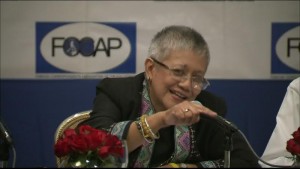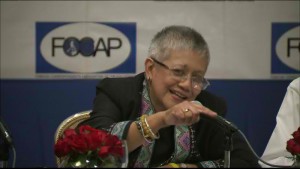By TESSA JAMANDRE
 THE Aquino government, in reviewing the peace process with the Moro Islamic Liberation Front, will examine the terms of reference and roles of the third-country facilitator as well as state parties and international nongovernmental organizations before restarting talks.
THE Aquino government, in reviewing the peace process with the Moro Islamic Liberation Front, will examine the terms of reference and roles of the third-country facilitator as well as state parties and international nongovernmental organizations before restarting talks.
Presidential Adviser on the Peace Process Teresita Deles said while the government is still reconstituting its peace panel, the state parties will have to cease their activities in this regard except for the International Monitoring Team (IMT) composed of military and police contingents from Malaysia, Brunei, Libya and civilian experts from the Japan International Cooperation Agency (JICA).
“The facilitator and the International Contact Group (ICG) definitely (will be reviewed) because until talks are restarted they are not active. Once we are ready, once our negotiating panels are set up, we will communicate so, but at the moment there is no official role of anyone there. The IMT is in place, but I understand EU and Norway have not brought in their people yet,” Deles told a forum of the Foreign Correspondents Association of the Philippines on Friday.
Malaysia had been a mutual choice between the government and the MILF as facilitator in the past. Deles said, however, any move to retain Malaysia would have to be discussed by the facilitating country and must be the subject of an agreement with the peace partner.
“I believe that we will continue to ask for the help of a foreign third-party facilitator. The IMT has certainly served well and that will continue. I think the review is more in terms of the terms of reference (TOR) because even in my discussion with ICG, for example, there was no clear TOR,” Deles said.
The Malaysian-led IMT established in October 2004 is overseeing the implementation of the ceasefire agreement between the government forces and the MILF. It has four stations deployed in the conflict areas. The economic component of the IMT is handled by two JICA experts providing assistance in overseeing the development projects.
Malaysia, the current-third country facilitator, has been brokering the peace talks between the government and the MILF for nine years now.
When asked if Malaysia has been informed that it ceases to be facilitator while the peace process is undergoing review by the new administration, Deles said, “My understanding is they know that it is so when the government changes it ceases. That’s my understanding from Department of Foreign Affairs. That is how those protocols go.”
As for the IMT where Malaysia has 39 peace monitors, Deles said the review will focus on the TOR to clarify what it should take when clashes break, what monitoring of development projects means, and what state parties should contribute.
Norway and the European Union will be sending representatives to the 60-member IMTto oversee the protection of civilians.
When clashes erupted following the aborted signing of the Memorandum of Agreement on Ancestral Domain (MOA-AD) in August 2008, the IMT suspended its mission after Malaysia pulled out its contingent in November 2008. It returned only last February after talks resumed in December 2009. The ICG was formed thereafter. It gives advice to the parties concerned on the Mindanao peace process and participates in the peace talks as observers.
Also on the request of the negotiating parties , as well as Malaysia, the ICG is composed of Japan, the United Kingdom, Turkey, and four NGOs.
Deles said the country’s bid for observer status in the Organization of Islamic Countries (OIC) will also be reviewed. The Moro National Liberation Front still holds observer status as representative of the Bangsamoro People in the Philippines. The country has
